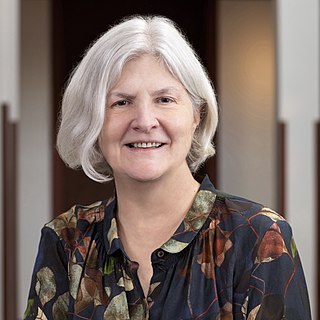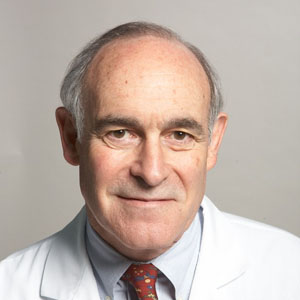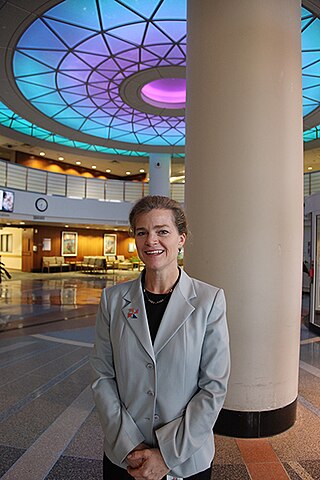Related Research Articles
Charles Robert Scriver was a Canadian pediatrician and biochemical geneticist. His work focused on inborn errors of metabolism and led in establishing a Canada-wide newborn metabolic screening program.
Judith Goslin Hall is a pediatrician, clinical geneticist and dysmorphologist who is a dual citizen of the United States and Canada.
The Duke University School of Medicine, commonly known as Duke Med, is the medical school of Duke University. It was established in 1925 by James B. Duke.

Nancy C. Andrews is an American biologist and physician noted for her research on iron homeostasis. Andrews was formerly Dean of the Duke University School of Medicine.
Ann M. Arvin is an American pediatrician and microbiologist. She is the Lucile Salter Packard Professor of Pediatrics and Professor of Microbiology & Immunology Emerita at Stanford University. Arvin is a specialist of the Varicella zoster virus (VZV) and a prominent national figure in health. Arvin is currently the chief of the infectious diseases division of pediatrics at the Lucile Packard Children's Hospital, as well as the former Stanford's Vice Provost and Dean of Research.
Hans Dieter Ochs, is an immunologist and pediatrician. He is Professor of Pediatrics, Division of Immunology, Department of Pediatrics, University of Washington School of Medicine, Seattle.

Robert J. Desnick is an American human geneticist whose basic and translational research accomplishments include significant discoveries in genomics, pharmacogenetics, gene therapy, personalized medicine, and the treatment of genetic diseases. His translational research has led to the development of the enzyme replacement therapy (ERT) and the chaperone therapy for Fabry disease, ERT for Niemann–Pick disease type B, and the RNA Interference Therapy for the Acute Hepatic Porphyrias.

Huda Yahya Zoghbi is a Lebanese-born American geneticist, and a professor at the Departments of Molecular and Human Genetics, Neuroscience and Neurology at the Baylor College of Medicine. She is the director of the Jan and Dan Duncan Neurological Research Institute. She was the editor of the Annual Review of Neuroscience from 2018-2024.

George Quentin Daley is the Dean of the Faculty of Medicine, Caroline Shields Walker Professor of Medicine, and Professor of Biological Chemistry and Molecular Pharmacology at Harvard Medical School. He was formerly the Robert A. Stranahan Professor of Pediatrics at Harvard Medical School, Director of the Stem Cell Transplantation Program at Boston Children's Hospital, and an investigator of the Howard Hughes Medical Institute, Associate Director of Children's Stem Cell Program, a member of the Executive Committee of the Harvard Stem Cell Institute. He is a past president of the International Society for Stem Cell Research (2007–2008).
Arthur J. Ammann was an American pediatric immunologist and advocate known for his research on HIV transmission, discovering in utero transmission and the risk of contaminated transfusions and blood products, and his role in the development of the first successful vaccine to prevent pneumococcal infection in 1977. He founded Global Strategies for HIV Prevention and was Clinical Professor of Pediatrics at the UCSF Medical Center.
Maria Iandolo New(1928-2024) was a professor of Pediatrics, Genomics and Genetics at Icahn School of Medicine at Mount Sinai in New York City. She is an expert in congenital adrenal hyperplasia (CAH), a genetic condition affecting the adrenal gland that can affect sexual development.

Julie Story Byerley is an American physician who is known as a leader in the fields of medical education and pediatrics. Byerley has served as a clinical professor and Vice Dean for Education for the University of North Carolina at Chapel Hill School of Medicine. She currently serves as President and Dean of Geisinger Commonwealth School of Medicine as well as Executive Vice President and Chief Academic Officer for Geisinger Health System.

John M. Opitz was a German-American medical geneticist and professor at the University of Utah School of Medicine. He is best known for rediscovering the concept of the developmental field in humans and for his detection and delineation of many genetic syndromes, several now known as the "Opitz syndromes" including Smith–Lemli–Opitz syndrome (SLOS), Opitz–Kaveggia syndrome (FGS1), Opitz G/BBB syndrome, Bohring–Opitz syndrome, and other autosomal and X-linked conditions. He is founder of the Wisconsin Clinical Genetics Center, the American Journal of Medical Genetics, and was a cofounder of the American College and American Board of Medical Genetics.
Barbara J. Stoll is an American pediatrician and professor. She is the H. Wayne Hightower Distinguished Professor in the Medical Sciences, Professor of Pediatrics and former Dean at the University of Texas Health Science Center at Houston.
Margaret Ann Pericak-Vance is an American human geneticist who is the Dr. John T. Macdonald Foundation Professor of Human Genetics and director of the John P. Hussman Institute for Human Genomics at the University of Miami. She is known for her research on the genetics of common human diseases. This research has led to a number of findings of genes that increase the risk of certain diseases, such as apolipoprotein E and Alzheimer's disease, IL7R and multiple sclerosis, and complement factor H and macular degeneration.

Sallie Robey Permar is the pediatrician-in-chief at NewYork-Presbyterian / Weill Cornell Medical Center and the chair of the Department of Pediatrics at Weill Cornell Medicine. Her research focuses on infections affecting newborns.
Eliana Perrin is an American pediatrician, researcher, and Bloomberg Distinguished Professor of Primary Care with joint appointments with tenure in the Department of Pediatrics in the School of Medicine and in the School of Nursing at Johns Hopkins University. She was elected a member of the American Pediatric Society in 2021.
Scott Andrew Rivkees is an American physician-scientist and pediatric endocrinologist, who served as State Surgeon General and Secretary of Health of Florida from June 2019 to September 2021. The majority of Rivkees' tenure coincided with the COVID-19 pandemic.
James M. Oleske is an American pediatrician and HIV/AIDs researcher who is the emeritus François-Xavier Bagnoud (FXB) Professor of Pediatrics at Rutgers New Jersey Medical School in Newark, New Jersey. He is best known for his pioneering work in identifying HIV/AIDS as a pediatric disease, and treating and researching it beginning in the 1980s. He published one of the first articles identifying HIV/AIDS in children in JAMA in 1983 and was a co-author of one of the articles by Robert Gallo and others identifying the virus in Science in 1984.
Cynthia J. Curry is an emerita tenured University of California San Francisco Professor of Pediatrics and an adjunct Professor of Pediatrics at Stanford University. Board certified in pediatrics and clinical genetics, Curry has practiced as a clinical geneticist for over 20 years in Fresno, California with associations to St. Agnes Medical Center and Community Regional Medical Center.
References
- 1 2 3 4 "Duke University Immunologist Buckley Is Cited For Transplantation Research". The Scientist Magazine®. Retrieved 2019-08-22.
- 1 2 3 "Rebecca Hatcher Buckley : Commencement: The University of North Carolina". commencement.unc.edu. Retrieved 2019-08-22.
- ↑ "Rebecca Buckley, M.D., Elected to National Academy of Sciences | Immune Deficiency Foundation". primaryimmune.org. Retrieved 2019-08-22.